Photography by David Vernon
Within minutes of meeting her, it’s easy to see how Joan Krupa has earned her reputation for steady leadership and genuineness in a political field often lacking it. Her secret? Always putting family first, she says with a smile. Everything she does is an extension of her faith, which has helped in balancing a career that’s thoroughly spanned the public health and public service sectors in central Illinois.
A staunch advocate for education, Krupa graduated from Bradley University and began her career as a teacher and elementary guidance counselor. After earning her master’s degree in counseling, she worked as assistant dean of women at Bradley, then as the parent coordinator for the Peoria County Bright Futures program, a job that piqued her interest in the importance of healthcare access for at-risk families.
While raising three boys, Krupa served two terms on the Peoria County Board before becoming executive director and CEO of Heartland Community Health Clinic, where her six-year leadership was instrumental in growing the nonprofit to become Peoria’s first federally-qualified health center. Inspired by her work at Heartland, healthcare became an important part of Krupa’s agenda when she announced her candidacy for the state legislature in 2008. Although she lost the election, Krupa represented the 92nd District in the Illinois House of Representatives for nine days in early 2009 after predecessor Aaron Schock was sworn in as a U.S. Congressman representing Illinois’ 18th Congressional District.
Looking back at the string of jobs that became her life’s work, Krupa says each opportunity came through connections to her volunteer work and board positions: a dedicated list of causes including the Asbury Theological Seminary, First United Methodist Church, Chi Omega House Corporation, Quality Quest for Health, Heart of Illinois United Way, Peoria Riverfront Museum and Greater Peoria Mass Transit District.
A steady voice for the less fortunate, Krupa has received myriad awards for her extensive volunteer work in the community, including the Peoria Area Chamber of Commerce Tom Connor Service Award, University of Illinois College of Medicine’s Dr. Joseph S. Solovy Award for community health, Lions Club Outstanding Service Award, National Association of Social Workers District 9 Public Service Citizen Award, YWCA Legend Award and Junior League of Peoria Sustainer of the Year Award.
Tell us about where you were raised and your early inspirations growing up.
Both of my parents were consummate volunteers in the community, and I just grew up seeing volunteering as a natural expression of my faith. My dad was assistant superintendent of Decatur Public Schools, which at that time was the third largest school district in the state. My mother taught kindergarten until she was 70. They gave me a strong faith that has continued to enrich me my whole life.
I was born in Decatur. At the time, Decatur was a great blue-collar community with lots of resources and a wonderful place to grow up—safe, healthy. I really thought I’d be happy in Decatur the rest of my life. But when I was 18, I entered Bradley University. Bradley was terrific, and that’s where I met my husband. I got out a semester early, but we were married just as soon as we could when we graduated.
I have been really blessed all my life with strong family, and also with a husband who believes in volunteering, too. When he was in his 30s [Ted] was named one of the top 10 Jaycees in the state, and he’s always been very active in our community. When you have both people valuing volunteering, it makes it a lot easier to do.
Tell us more about your different roles as a teacher.
I only taught first grade for one year, then I became an elementary guidance counselor. I went back to Bradley as assistant dean of women, and I worked there until I had my first child. Then I was a stay-at-home mom and volunteer for many years, until I went back to Bradley and was involved as a parent coordinator for the [Peoria County] Bright Futures program for 13 school districts.
I taught part time at ICC, but my most interesting teaching assignment was director of adult education at the Peoria County Jail for four years… I was so impressed with the level of commitment that the students had… It was like running a one-room schoolhouse, because you had people reading at the fourth-grade level up through high-school [levels]. I had a very high percentage of my students finishing their GED, which gave them a leg up when it came to trying to find [a job], because you know how hard it is when you’ve got a record. So that was rewarding.
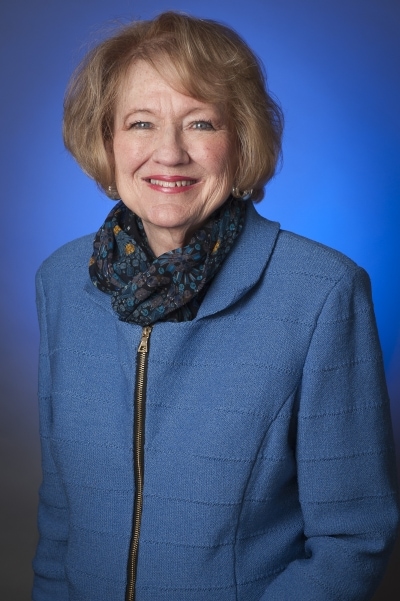 I feel very strongly that education is the foundation for any democracy. If you want a country to succeed, you have to have a strong education for your citizenry. You can do it various ways, but you better make sure that you have an educated group of citizens if you want to maintain a democracy.
I feel very strongly that education is the foundation for any democracy. If you want a country to succeed, you have to have a strong education for your citizenry. You can do it various ways, but you better make sure that you have an educated group of citizens if you want to maintain a democracy.
You’ve dedicated yourself to underprivileged populations throughout your career. How have you coped with the stress of serving other people’s needs?
I’ve lived by a Bible verse, Romans 8:28, and that is, “All things work together for good for those that love and serve the Lord and are called according to his purpose.” What that means is that even if there are tragic or terrible things you’re faced with, if you believe that the Lord can use those for his purpose… good things will come out of it.
I can name many things that have happened to me that could’ve destroyed me… but can be used for growth, for stretching yourself, for forgiveness, for all kinds of things that make you a better person. The worst thing you can do is harbor grudges or misfortunes. It’ll kill you. When I’m hit with a stressor I don’t think I can deal with, I turn to prayer and turn it over. I let someone else work on it (smiling).
Tell us about the volunteer roles you took on while also raising your kids.
To me, volunteering… was my lifeline. It gave me a sense of accomplishment other than the most important job, which was being a mom and at least a decent wife (smiling). I loved volunteering. Some of my richest experiences in life, and definitely my best friends, came from my volunteer work.
When I came back from living overseas, I was asked by the people I had served with on the founding board for Heartland Community Health Clinic to apply [for the CEO position]. People knew how much I loved the mission… [but] I never thought I would take that job. For one thing, I didn’t have any medical background. But I did know how to work with volunteers.
My whole life was volunteer involvement, so when I went in for the interview, I thought, you know what? I could do this job—and they were kind enough to give me a chance. And it morphed into something I never expected. So again, throughout my life I have just been blessed by volunteering, and I’ve tried to give that back to the community.
So what was the learning curve like for you as CEO at Heartland?
(Laughs) Crazy! I knew my skills, particularly in the area of grant writing, and I was working with a lot of people that I had known for years through other groups. I had been president of United Way, and [there were] other groups through which I had met a lot of people that knew me. So there was a level of trust that you don’t often get unless you’ve worked with somebody for a number of projects or years. So… they trusted me, and I could trust them…
We had help from one of my very dearest friends, Barbara Drake [former Journal Star opinion page editor], who… had been writing editorials about [Peoria’s] need for a federally qualified health center (FQHC). We were one of the largest cities in the country that didn’t have one. So she got the ball rolling from a PR perspective. I immediately saw this was a niche we needed to explore.
I began to organize a community collaboration of various groups represented from the hospitals [and] different political organizations… It was a perfect example of how hard it is to build a collaboration, but how successful it can be if you’re all focused on the mission of what you want at the end. Our organization totally changed, and without the help of these groups… we wouldn’t have a Heartland today.
We had 850 patients when I came, and when I [retired], through a community collaboration, we had become an FQHC with 16,000 patients. Today, they have 18,000 patients. It was still a 501(c)3, but it went from treating just the working poor not on Medicare or Medicaid, to accessibility to anybody who needs a medical home.
Was it hard to leave when you decided to retire?
I worked there for six years. We had a balanced budget, everything was running smoothly, and I was turning 62, so I thought, this is the time for me to leave. It was also the time I decided to run for office.
It was very hard to leave because I was so proud of what we had accomplished, and I could see the possibility of the future. But people serve at different times in different ways for different reasons… We had accomplished what I had hoped, which was sustainability. And then there was this opportunity opening up for me to run [for the 92nd Illinois House District].
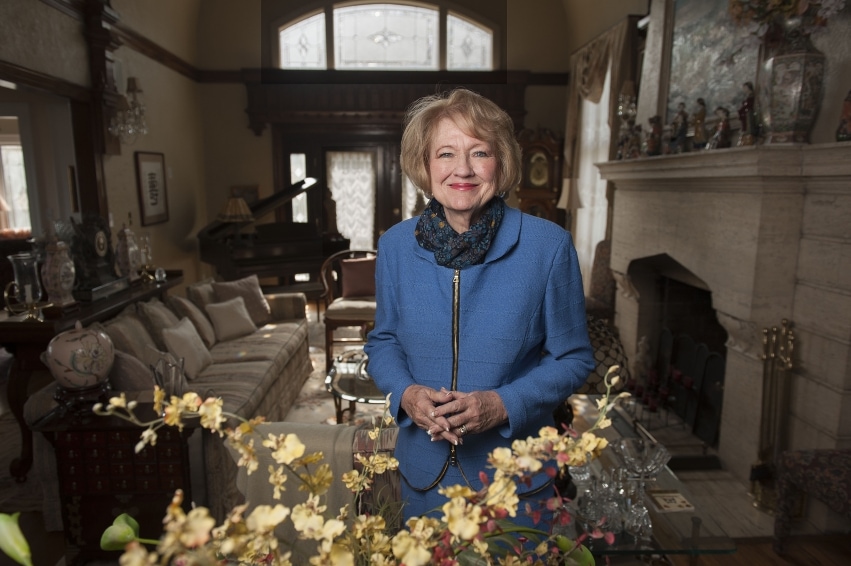
What prompted your decision to run for state representative?
I had been a successful candidate for the Peoria County Board. I had run twice, and then the third time I didn’t even have an opponent, which was great, except that then Ted was called to go to Asia… But I had had a very positive experience on the County Board.
I have always been interested in service that has a political tag to it. When I was in sixth grade, I ran for student council president, and I won. I was always interested in it in high school, and then in college I was a student senator, and that’s how I met my husband! He was student senator, too, and we fell in love. And 50 years later, we’re still in love (smiling).
…And the opportunity was out there, because Aaron Schock was running for Congress. There was an empty seat, and it was in the area where I lived. It wasn’t to be, but I still don’t regret running. I really, truly learned a great deal.
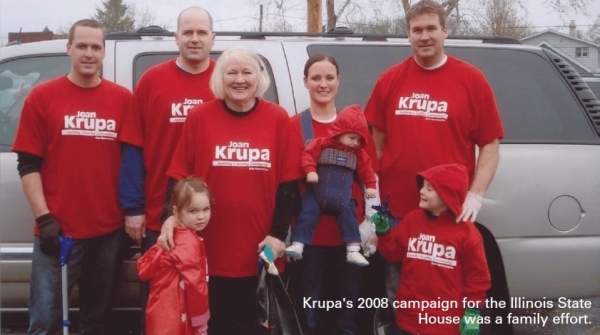
So following the loss, did you know the appointment to fill Schock’s seat was coming?
No! It didn’t even occur to me. For one thing, I didn’t know it had to be a Republican assigned to fill that seat. I just assumed my opponent, Jehan [Gordon-Booth], would take over earlier.
I was actually in Kroger checking out, when I got a call asking if I would consider being the state rep for nine days—if I were approved by the small group of Republican bigwigs in the county who would make that decision at the recommendation of U.S. Representative Aaron Schock. So it came totally out of the blue. I said, “It sounds great! I’ll have to think about it, but I love the idea!”
So I went, and it turned out to be extremely exciting when, on your first day in office, there’s The New York Times taking your picture because you’re about to vote on the impeachment of a governor [Rod Blagojevich].
That was your first day? What a whirlwind!
It was very satisfying. The vote wasn’t close, but to be involved in that historic period was really exciting. And then I was asked to run again, and decided once-in-a-lifetime for that kind of situation was enough. But I was so glad to have the opportunity.
So how did you keep busy following the election?
As soon as I lost the election, I was asked to do a couple of things, one of which was to be on the [Peoria] Riverfront Museum Founding Board, so I quickly found myself immersed in that. I was also asked… to chair a group called Quality Quest for Health. It was sponsored, for the most part, through Caterpillar and OSF, and its goal was to quantify outcomes and make it so people could have access to doctors’ competencies online [and] to medical record keeping.
I’ve also been extremely active in our church. We’re members at First United Methodist. It is a downtown church, and when the other downtown churches were leaving to go out to the suburbs, we consciously felt that God was calling us to stay downtown. Since then, the Loaves & Fish program that Patti [Bash] started is just amazing. I actually work in a little segment of that program. I mark clothes and then we have a free clothing giveaway twice a month. They have a free clinic that now works with Heartland… [It’s] just a great program.
Sounds like you didn’t slow down in your retirement.
I got busier! (Laughs) I just never got paid for it. I’m also in my third year of a four-year [appointed] term representing Peoria Heights on the CityLink [Greater Peoria Mass Transit District] Board. In the early ‘70s, the City of Peoria, Village of Peoria Heights and West Peoria founded the transit authority, and now contract with outlying cities outside our area. This was a real natural fit for me because most of the people I work with need bus transportation… Mass transportation is critical to them being employed, and getting to their doctors’ appointments [at] Heartland.
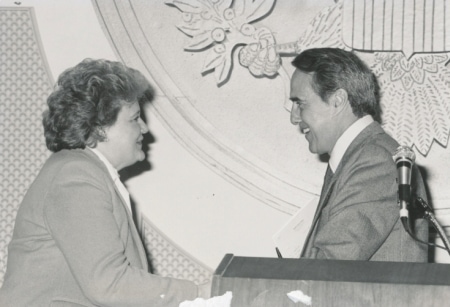
In 1985, Sen. Bob Dole spoke at a public policy conference emceed by Krupa in Washington, DC.
How have you seen women’s role in politics change over the years in local government?
Women have always had leadership roles; they’ve just been defined differently. I encourage young women to do what they can with their limited time. My biggest fear is that young women today who are juggling careers and home life—and often times are single parents—won’t have the opportunity to invest in something like a political office or a high-level volunteer job, or even volunteer jobs that used to be filled easily, just because they don’t have the time or energy.
When I went on the County Board, I think there were three or four women, and I would like to see more women today. I think the City Council and County Board are good levels of government to become involved in.
One of the ways I got into politics was as public policy chairperson of the international board of Junior Leagues. At that level, I was in Washington and one of our projects was trying [for] unpaid medical leave. It was considered far left-wing, and here’s a young Republican woman going to Washington on behalf of her organization to testify before Congress that we needed unpaid medical leave (laughs).
Have you always straddled that bipartisan fence?
I think one of the saddest commentaries of today’s politics is that you’re seen as an “R” or a “D,” or a Fox watcher or CNN watcher. It wasn’t like that when I was on the County Board…
This last election was very traumatic for a lot of people on both sides. My hope and prayer is that we can look at why our country was founded in the first place, and then do our best to try to calm the waters and work toward the goal of staying united as a country. I think that people like Ray LaHood and his predecessors, and Bob Michel are wonderful examples of bipartisanship. And without [them] and Everett Dirksen and many others, we never would have had the civil rights acts that we did. We never could have done it if we weren’t together. And we could accomplish so much more today.
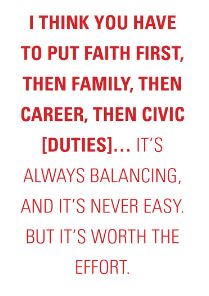 How do you prioritize your time today?
How do you prioritize your time today?
That was another bonus of losing [the election]—I have three grandkids who live in Morton… and I love spending time with them. But my claim to fame is that I have three sons, and they live on three different continents…
My youngest went to the Hong Kong International School [when we were living in China]. The only downside of it is he loves Asia, and he lives in Asia. If he hadn’t grown up there, maybe he’d be back in the U.S. now! (Laughing) But the good news is he married a wonderful woman from Hong Kong who is a dear daughter-in-law, so it turned out to be a great decision.
The middle one is a missionary in the Czech Republic… It’s easier today because I can talk on WhatsApp, or I can call, and if I drive to Chicago, I’m one plane ride away from Hong Kong or the Czech Republic. So it’s not like it used to be. It still is not always easy, and I would love for them to be in my backyard (laughs)…
The other bonus about losing is that my mother was living in Peoria at the time… In her last years, I was able to spend a lot of time with her. She died when she approached her 99th birthday. I felt really blessed by her having had family around and us being accessible.
Between your family, faith, career and volunteer work, do you feel that you ever accomplished a true balance?
I think you have to put faith first, then family, then career, then civic [duties]… It’s always balancing, and it’s never easy. But it’s worth the effort. I don’t do things just to keep busy; I do them as an extension of my faith. Nobody will come up and say, “Joan preached to me,” or anything like that. I’m hoping my life’s work will be an example, and that people won’t have to ask, is she a follower of Jesus Christ? They’ll see my life and [know].
I have been on the Board of Trustees of the nondenominational group, Asbury Seminary. Again, it was a chance to be a leader in my faith, but also to show that women can have leadership positions in various arenas, and you can actually be a Christian in politics without having to take a litmus test. I was on the Asbury Seminary board and running for politics in the State of Illinois… and I didn’t see that as an “either-or.” I think people who are involved in government should have high degrees of religious or ethical or moral beliefs. I think the balancing act is you have to really be strong in what you believe, regardless of which arena of your life you’re working in.
What do you want to be most remembered for publicly, and is it the same thing you want to be remembered for by your sons?
Absolutely not! (Laughs) [My boys] don’t see me as a public figure… I guess I would have to say I would like to be remembered as a leader who was authentic and who really cared about her family and community.
I would say if I had any advice to give to people: if you look upon what I’ve done, I couldn’t have possibly planned for this. And I think people need a couple of things, like the courage to step out into areas they haven’t tried before.
I could tell you stories about my life in China that have just been remarkable… that if I hadn’t had that opportunity and been willing to risk leaving where I’d lived in central Illinois my entire life, I wouldn’t have come back and done some of the things that I’ve done today. So, the courage to step out in areas that you don’t necessarily feel qualified for, but that you have a passion for, that’s really important.
And the other thing is the willingness to do jobs that other people don’t want to do, or that nobody will know you’re doing. They lead to some remarkable opportunities. If I feel like there’s a need for something, and I’m being called to do it, I do it. I don’t have anything to prove. But you know what? This opportunity to talk to you has really been lovely for me because I haven’t stopped to think about these things (smiling). What a wonderful bunch of privileges I’ve had in life, and how lucky I’ve been. iBi


